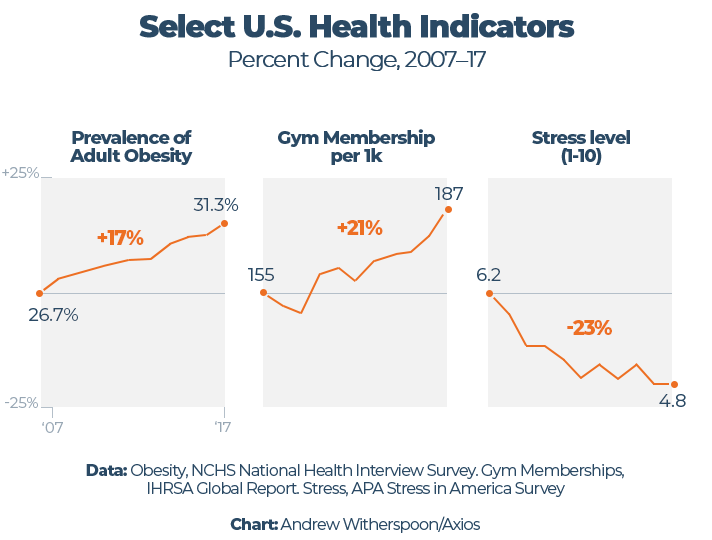I swear, every time I am on the internet, I’m told to try out some new weight-loss pill or drink, dieting meal plan, or sign up for an online fitness subscription. While it may be easy to scroll by, it makes me wonder about the obsession society has with “health.” I say “health” because it is a relative term—obviously, we all want to be healthy, but when it comes down to it, healthy means something different for everyone.
Trying to help people feel their best is a noble cause, but I can’t help but think that these gimmicky diets and flashy fitness Youtubers are missing something when it comes to getting healthy.
That thing just might be sleep.
Diet and Exercise Industry
I know I am not the only one bombarded daily by new diets, products, and exercise programs that tell us that our health can drastically change in a matter of weeks or days. Companies know exactly how to snatch up our business—before-and-after photos, product reviews, and your favorite influencer promising that it is the only thing that works. They have proven to be quite effective in advertising; the industry is worth over $66 billion and estimated to grow by the year.
The problem is that the majority of dieting- and exercise-based companies are not actually proven to be effective and have little to no scientific backing. While the industry has been raking in more cash each year, obesity rates have only increased.

Source: “Health and Wellness Are Booming, but We’re fatter than Ever” – Axios
This ultimately stems from a misunderstanding about weight loss and health. Genetics is a huge factor in and of itself—metabolism, blood sugar, how many calories your body stores, family history, anxiety, among others. So how does rest fit into the mix?
Is Sleep a Forgotten Piece of The Puzzle?
Although most might believe that weight is due exclusively to diet and exercise, shuteye has been proven to play a role in our health as well, from the hormones that are released during rest to late-night cravings that can lead to overeating. Research even shows that night owls tend to weigh more than morning people, which begs the question: what in the world happens to our appetites at night?
Our Metabolism During Rest
Burning calories can only be done during the day, right? Well, despite what you may think, you are burning calories without even knowing it. While you are flying around in dreamland, your body is actually doing some work behind the scenes.
During REM, in particular, our metabolism speeds up, using that energy we consumed during the day. It is no surprise, then, that resting less or poorly slows the metabolism, meaning less energy is being used or fewer calories are being burned.
Research has found that more insulin and cortisol are made when we get lower-quality or less rest than we should, and higher levels of insulin and cortisol tell our bodies to store extra calories as fat. These extra calories from less slumber are stored as fat, specifically in the abdomen.
Exhaustion and Our Appetites: How We Eat When We’re Sleepy
Have you ever noticed that you often get the munchies while watching late-night television? No, those Doritos aren’t actually calling your name from the pantry. Your body, however, might be telling you that they are.
When our bodies are short on sleep, two hormones are affected: ghrelin, which tells us that we are hungry, rises and leptin, which tells us that we are full, decreases. The increased cortisol levels we touched on earlier tell our brain that we need serotonin, a neurotransmitter that juggles our mood and appetite. Fat and carbs release serotonin in our bodies, leading to cravings.
This is all very sciency talk for saying that the need for a midnight snack could definitely be chemical.
Sleep Deprivation and Weight Gain
All those nights of calorie storing and snacking can lead to weight gain. Loads of research has confirmed that less rest is positively correlated with gaining weight. In fact, one long-term, 16-year study followed 68,183 women and their weight and rest habits.
Those who averaged 7 or more hours of slumber gained less weight than those who got less, which suggests that consistent sleep deprivation has an association with putting on extra pounds and incident obesity.
Impact of High-stress Lifestyles
For me and many others, stress commonly gets in the way of a good night’s rest. Unfortunately, less sleep also increases stress, so sometimes it can feel like there is no escape. As we now know, sleep deprivation can lead to late-night eating, and for many, overeating foods that are not dietarily beneficial comes hand-in-hand with stress and anxiety.
Those who live a high-stress lifestyle may find themselves feeling these effects day-in and day-out, and this can create a rocky relationship with both food and rest.
Sleep Disorders and Weight: A Vicious Cycle
A vicious cycle indeed, sleep disorders lead to weight gain, and those who are overweight are more likely to encounter disorders. The first part of overcoming this is getting diagnosed, but many do not even know that they have one.
Sleep Apnea
If you think that you do not know anyone with apnea, think again. “It is estimated that 22 million Americans suffer from sleep apnea, with 80 percent of the cases of moderate and severe obstructive sleep apnea undiagnosed,” says SleepApnea.org. Sufferers may think that they are getting the amount of sleep that they need, but the quality is critically lacking, and it is no surprise when your body has to work overtime all night long.
Apnea is correlated with metabolic dysregulation and type II diabetes, both common in those who are overweight.
Insomnia
While insomnia and obesity do not have quite the correlation that sleep apnea and obesity have, there has been some research showing possible links. We do know, however, that less sleep can affect the metabolism and hormone imbalances, and those who struggle with insomnia are no strangers to restless nights.
If you’re uncomfortable when you sleep, make sure to check out our Best Mattress for Sciatica Nerve Pain as well as our Best Mattresses for Spinal Stenosis to help you sleep in comfort.
More Rest, Less Weight? Is it That Simple?
If only it were. Getting enough quality rest is just as important as avoiding oversleeping. Similar to less rest, too much sleep has been linked to a higher risk of obesity.
One six-year study of 276 people found a higher rate of type II diabetes or glucose intolerance in those sleeping an average of 9 hours or more. This group also had a 21 percent increased risk of obesity and gained an average of 11 pounds more than those who slept between 7 and 9 hours.
Biologically, we are all different, so you may need more or less rest than your spouse, neighbor, or coworker. Generally, healthy adults need around seven to nine hours of sleep a night. So how do we achieve that balance?
Tips for Better Rest
Nighttime Routine
Humans thrive on routine, and having a bedtime ritual gets your body ready to shut down for the night. Meditate, listen to a relaxing podcast, or take a warm bath or shower to get in the sleepy mindset. If these are not your style, check out some other ideas here.
Shut Down the Technology
While it may seem innocent to scroll through social media or check your email before dozing off, you might be doing more harm than good. Research has shown that lights from your phone or television impair your ability to rest and decrease melatonin levels (your drowsy hormone). Turning off your phone or tablet at least a half an hour before bed can increase the quality of your rest and help you fall asleep more quickly.
Find Time for Naps
Rather than binging your favorite television show on Sunday afternoon, think about catching up on some zzzs instead. Your lunch break can also be used to grab a quick nap. Make napping a priority to assure that you are getting the right amount each day.
Consistent Wake-up Times
Just as a predictable bedtime routine can lead to better rest, waking up at the same time each day can help your body regulate its circadian rhythm. Yes, that may mean no more sleeping in on weekends, but your body will thank you by dozing more soundly.
Ask Yourself: Tired or Hungry?
You might think that you are hungry late at night, but it could instead be your hormones trying to rebalance. Think twice before scooping a bowl of ice cream because you might only need some good shuteye.
Strategic Bedtime Snacks
Although eating close to bedtime is closely associated with obesity, you do not want to deprive yourself of food if you really are hungry. To get yourself through the night, try to keep your snack close around 200 calories or less so that it will not interfere with quality shuteye. Fruit, nuts, or eggs are some great places to start.
Here are some neat ideas that you can try for your next pre-bedtime snack.
Questions for Your Doctor
Could I have a sleep disorder?
Disorders consistently interfere with quality rest that you desperately need. If you cannot fall asleep multiple times a week or wake up after hours of sleep feeling restless, talk to your doctor about some possible disorders. Among many other problems, these can lead to issues controlling weight and should be treated.
Does sleep burn fat?
While you should not expect a drastic change in weight due to increased sleep, during the night, your body burns calories and your metabolism should be working overtime. Your doctor will be able to go more into detail about your specific situation and what you can expect from healthy resting habits.
Are my sleep habits interfering with my weight control?
Too much or too little rest can get in the way of your health, as can technology before bed, sleeping with the television on, going to bed too late, and more. Discuss your nightly routine with a medical professional to get their take on some things you can alter for a better chance at controlling weight.
Are there sleep therapies you recommend?
Many overweight people struggle with apnea, and CPAP machines are proven to be a successful form of therapy for sufferers. While this is the most common therapy for those trying to manage health, your doctor will be able to discuss any options for your particular situation.
Should I undergo a sleep study?
Sleep disorders are constantly going undiagnosed because thousands of people do not even know that they have one. A sleep study, or polysomnography, will track brain waves, heart rate, oxygen levels, and movements, and professionals will be able to see any signs of a possible disorder. While many can be treated without a study, those who are unsure of a problem may benefit from diagnosing any underlying issues there may be.
When is the best time for me to exercise?
Although this can vary from person to person (and from exercise to exercise), generally at least four hours before bed is best. A doctor will be able to analyze personal factors that may go into workout timing, such as intensity and time of day.
Conclusion
With all the research out there, we all should know that controlling weight is not as simple as the diet and exercise industry likes to make it seem. While we may not be able to escape its reach, we can try to manage our health using scientifically proven methods, understanding that it is ultimately a personal thing, and there is no one-size-fits-all approach.
If you are on the weight management journey, there is no harm in starting with a good night’s rest.
Looking for another way to improve your sleep? Explore our top picks for the Best Mattresses for 2024.

Jess Carpenter
Content Writer
About Author
Jess is only serious about a few things in life: sleeping, writing, and making the perfect chocolate chip cookie. In her free time, you’ll probably find her having a dance-off to ‘80s pop with her family or watching scary movies with her cat, Waffles.
Combination Sleeper
